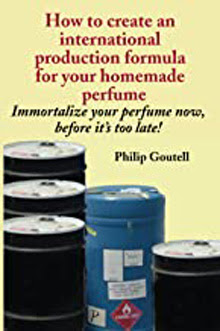Being trained in perfumery, face-to-face, by a knowledgeable, professional perfumer is a very big plus. But finding a qualified perfumer-trainer who can devote time you you -- at times that are convenient for you -- is not an easy matter. Ask yourself, "how many hours might this project take?" The truth is it will take more hours -- more days -- more weeks -- than is practical unless you are devoting your life FULL TIME to becoming a perfumer.
I have now completed three 5-Day Perfumery Workshops with Steve Dowthwaite of PerfumersWorld. At each workshop, while I learned some new material, the most valuable moments in these 90 plus hours of instruction and exercises were the verbal reinforcements of lessons I had previously been exposed to but whose importance I had not fully grasped.
In other words, many of the most powerful moments were a repetitions of facts and concepts I had already been exposed to but now -- sitting in front of someone who was TELLING me they were important -- these points became more firmly fixed in my head and I would pay more attention to them in my future work.
But ...
My training in perfumery did not start with face-to-face instruction.
Actually, when I first became interested in learning how commercial fragrances were developed and how I could make original perfumes of my own, I was not aware of ANY place where I could get ANY training until I stumbled across the home study PerfumersWorld Foundation Course.
At this time the internet had not yet developed into what it is today. Blogs didn't exist. Facebook didn't exist. Very few companies that sold perfumery materials -- synthetic or natural -- had websites. Online shopping was still in a primitive stage. Paypal was still a struggling start up.
I had spent money on books (many hundreds of dollars worth) and I had purchased a few aroma materials (without much of a clue as to how they "worked") but I needed HELP in understanding something that seemed as if it should be quite simple. I wanted to know how a commercial, big time perfume was made and I wanted to make perfumes myself.
So I ordered and received the PerfumersWorld Foundation Course. Ten blocks of online lessons; a box with materials to work with. Reading was required. Study was required. Carrying out student exercises was required. Passing exams was required. But there was no pressure. No teacher looking over my shoulder. It was all up to me.
Home Study vs. Classroom
It's harder to do a home study course successfully than it is to take a graded classroom course. (Grades and exams are important either way.) Correspondence course companies learned many years ago that a large percentage -- perhaps as many as 80 percent -- of their students would never complete more than the first few lessons. Why? Because learning involves hard work. (A former teach of mine once wrote a book, "Study is Hard Work.")
But the virtue of home study is that it opens the door for people who could not attend a school full time or even part time. Or, in the case of perfumery, for would-be perfumers who simply cannot find a source of face-to-face instruction through which they can fully learn the skills necessary to engage in this art.
Even the 5-Day Perfumery Workshops I have mentioned are only the beginning of someone's training in perfumery. You have to go on with your followup and keep working with your own materials and doing your own exercises and experiments.
So no matter how you slice it, unless you are planning a full time career in perfumery and have the good fortune to be accepted into one of the very few face-to-face schools of perfumery that exist, to learn to make perfume you MUST be willing and able to work on your own. And you must be MOTIVATED enough to take each lesson seriously and to continuously work at developing your skills -- with real perfumery materials. Motivation is the key.
But what can you learn on your own? How far can you go? Can you really learn to make fragrances that (if you had the marketing clout) could go head-to head with the very best offerings of the very biggest perfume companies? The answer is that, "yes," you can go to the top, but the farther you want to go, the more you must put into it.
It is at the beginning that you really discover how motivated you are and how far you are likely to go. With a home study perfumery course, I'd guess that most people -- yes, perhaps 80 percent -- do not get farther than the first few lessons. Why? Because once you have the lessons and the materials in your hands, you suddenly discover that leaning to become a perfumer involves work -- lots of work.
For those who love it, the work is nothing. They are happy to put in the many, many hours it takes to go from being a novice to becoming a competent perfumer.
For most of us who are interested in perfuming -- really interested -- working on our own with whatever authentic study materials we can find is essential. So, "no," you don't need face-to-face training to become a perfumer. All you really need is a course of instruction and the self discipline to harness and direct your ambition. But when the opportunity arises to work under the guidance of someone who knows more than you do, don't pass it up!
Monday, May 31, 2010
Subscribe to:
Posts (Atom)

